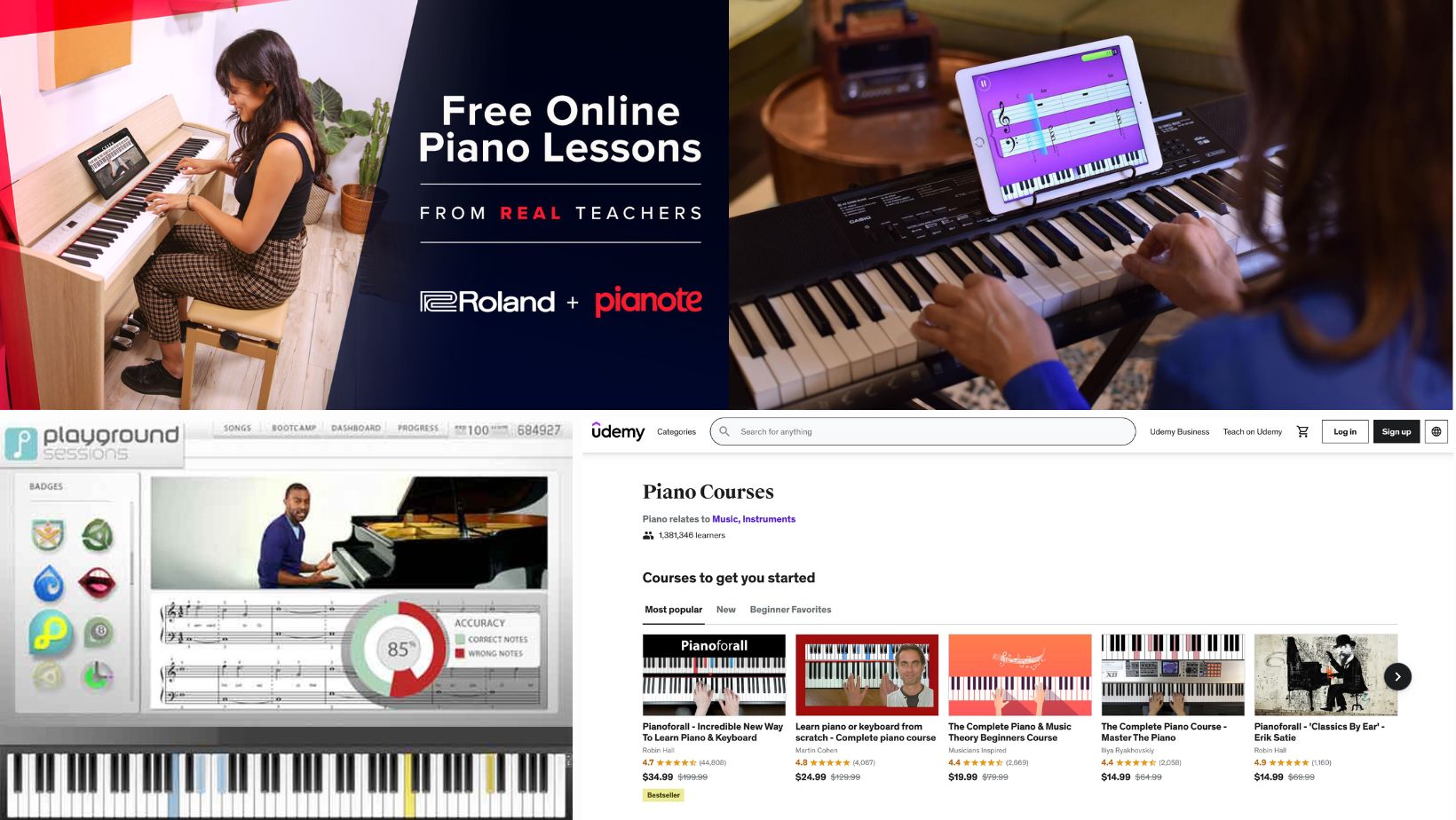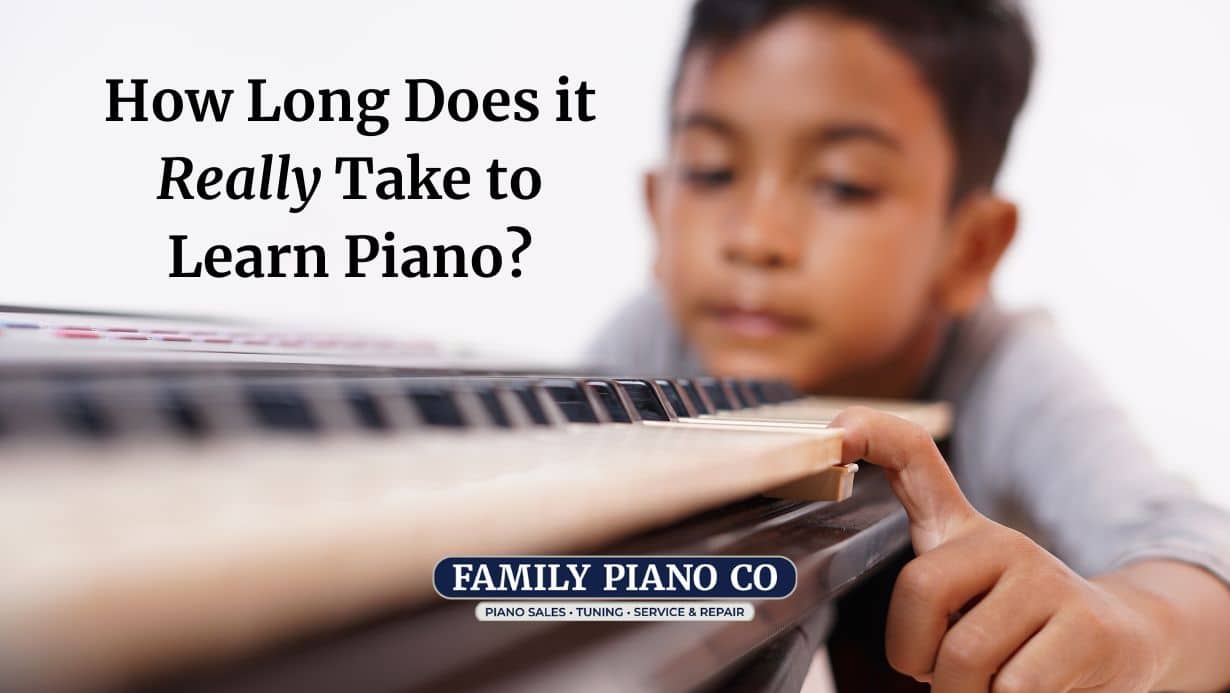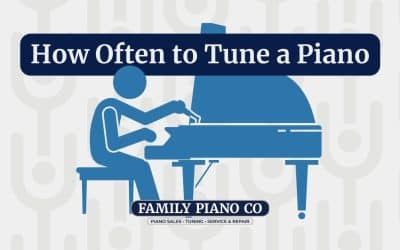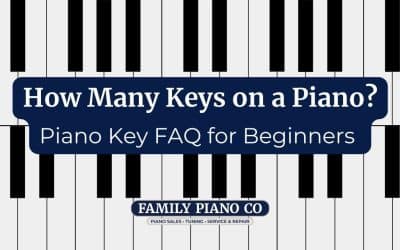Learning anything is a lifelong journey. So there is no singular answer to the common question, “how long does it take to learn piano.”
Ultimately, the time it takes to learn piano will depend on your goals, commitment, and natural abilities. Beginners who practice consistently tend to develop basic skills within a few months to a year, but most won’t feel comfortable calling themselves pianists at this point (even though they should).
We like to encourage everyone that they really can learn to play piano. If you’re a bit overwhelmed by the idea of learning to play, let’s cover what the road ahead may look like.
Is Piano Hard to Learn?
Learning to play the piano can seem daunting at first, but it’s important to remember that learning is not a destination.
We believe that most people can get to a decent level of playing within a couple of years of consistent practice. Of course, the amount of time it takes to learn will vary from person to person.
Like any skill, learning the piano requires dedication. Adults may have an advantage in terms of discipline and focus, but they may also have less time to devote to practice due to work and responsibilities. The opposite is true for children though — which is actually a factor that helps them learn faster!
We disagree with the idea that you’re ever too old to learn piano (or anything else) — click to read why.
A good instrument is important too! We’re not going to linger too much on which piano’s best for beginners. Acoustics are great, grands are the best, and digitals are just dandy as long as they have 88-key weighted-and-graded actions! Just don’t shoot yourself in the foot by trying to learn on a small plastic keyboard!
Ultimately, the key is to make consistent progress and keep practicing, even when it feels challenging. Learning piano may be harder to some than it is for others — but it’s never impossible. With the right approach, we genuinely believe that anyone can learn to play the piano.
How to Learn Piano By Yourself
Learning piano by yourself is definitely possible and has become increasingly popular in recent years.
With the abundance of cool apps and online lessons available, many beginners are choosing to go the self-learning route to start.
Some reputable online resources for learning piano include Udemy, Simply Piano, and Playground Sessions. Roland even bundles lessons from Pianote with every new digital piano they sell.

There’s nothing wrong with learning to play by ear either. In fact, we’ve worked with teachers who could only play by ear but were amazing performers. While classical training is often seen as the best way to learn piano at a technical level, it doesn’t have to be your goal.
Additionally, if you’re simply interested in learning a few songs, you can easily find tutorials on YouTube and other online platforms.
However, keep in mind that at a certain point of playing, your progress may plateau. At this point, to progress any further, you’ll then need a teacher.
A teacher will provide individualized feedback, help you avoid bad habits, and push you to take on challenges that you might not tackle on your own. As you progress and develop your skills, working with a teacher will undoubtedly help you refine your technique and take your playing to the next level.
So while it’s certainly possible to learn piano by yourself — and we even recommend trying if you have a limited budget or full schedule — having a teacher is extremely beneficial. There’s no doubt that finding a teacher you work well with will fast-track any students progress.
How Long Does it Take to Master Piano?
This is a harder question that doesn’t have a concrete answer. Decades and decades is our best answer.
It’s often thought that it takes about 10,000 hours to master something. However, it’s important to remember that everyone has different goals and learns at different pace.
It’s easy to see how even if you’ve played for decades, 10,000 hours tinkering around wouldn’t make for as much progress as 10,000 hours of dedicated practice with a top-notch teacher.
Instead of focusing on “mastering the piano,” we recommend acknowledging there are various stages you’ll go through as you continuously play and improve at the instrument.
And instead of worrying about “being good,” we strongly suggest you just focus on enjoying the process. You really don’t need to be an intense pianist to have fun playing piano — and you can even impress non-pianists with simple songs!
In terms of mastery overall, “it’s not about when you get it right, it’s about when you can’t get it wrong.” In other words, the goal of learning piano isn’t to master it quickly, but to keep improving. There will always be new highs to reach, but with consistent practice and a willingness to learn, you can achieve your goals as a pianist.
Stages of Piano Playing
|
Level of Playing
|
Duration of Stage
|
Practice Required
|
|
Beginner
|
3-12 months
|
0.5-1 hour daily
|
|
Intermediate
|
1-3 years
|
1-2 hours daily
|
|
Advanced
|
5-10 years
|
3-4 hours daily
|
|
Expert
|
12-20+ years
|
5-8 hours daily
|
How long should you practice piano a day? We answer this and other common questions in our Piano Practice Guide!
Beginner Stage
Here you’ll learn the basics of piano playing, such as finger placement, note reading, and basic music theory.
This stage can take anywhere from a few months to a year or more, depending on how much time you’re able to dedicate to practicing.
Intermediate Stage
Now a bonafide piano player, you’ll be building on the foundation you set as a beginner. So as your technique continues to develop, you should be starting to play more complex pieces of music.
This stage can take several years to progress through, and it’s important to stay patient and persistent during this time. Progress will not feel as fast as it did as a beginner, and this leads many people to give up on progress an simply keep playing where they’re at (which isn’t inherently a bad thing either).
Advanced Stage
Becoming a truly advanced pianist is a feat few achieve. At this point, you can play challenging pieces of music, sight read even complicated pieces, and have a deeper understanding of how to convey emotion through your instrument. A lot of your practice probably involves fine-tuning technique in addition to playing advanced pieces.
This stage can take several more years to achieve. Some people may never reach this level. And again, that’s not such a bad thing. If you’re enjoying playing simpler songs for friends, or you play piano as a means to produce or perform music, there’s no need to aim for this level of playing.
Expert Stage
Expert pianists are basically limited to professionals who practice for several many hours each day. So if you’re part of the lucky few that get paid to play piano, you’ll be able to continue improving your skills and reach new levels of mastery.
At this point, you’re making very minute adjustments to achieve absolute perfect technique — or even inventing new styles of playing yourself!
How Long Does It Take to Learn Piano? Forever!
No matter how skilled you become, there will always be new pieces to learn, new techniques to master, and new ways to express yourself through the instrument. Learning is a lifelong process, and you will always find areas for improvement.
So while there are rough estimates on how long it takes to learn piano or anything else, the truth is it depends on you and on how you define learning.
Do realize too that even expert and famous pianists like Elton John suffer from imposter syndrome and don’t think they are good players at times. Overcoming those feelings of self-doubt is frankly an important part of the journey!
So do not be discouraged if you feel like you’re not progressing as quickly as you’d like. Remember that every pianist, no matter how accomplished, once started as a beginner.
If you’ve already started playing and you’re wondering when you can call yourself a pianist, do it now. There’s no magic number of years or hours of practice that suddenly makes you one. If you’ve put in the time and effort to learn the instrument to any degree, you can proudly call yourself a pianist.
If you’re feeling overwhelmed by the idea of starting to learn piano, remember that taking that first step is worth it. Even if you think you’ll be crummy at first, it’s better to try and fail than to never try at all and wonder what could have been.
The journey of learning to play the piano can bring joy, fulfillment, and a sense of accomplishment that lasts a lifetime. We recommend you take the first step — or then the next step for as long as you enjoy it!
There are an immeasurable amount of benefits of learning piano. Click to discover a few proven ones.





Thankyou for your information it was very helpful and inspiring.
Cheers
Thanks for reading, Jordan! (: